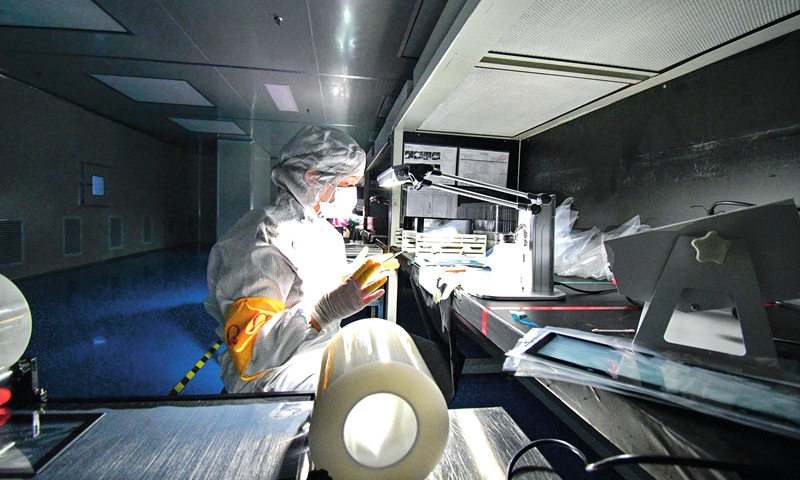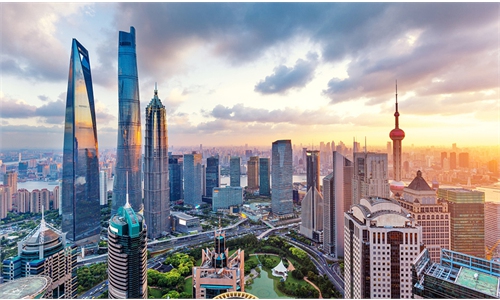More measures to optimize China’s business environment, key to boosting market confidence
Moves key to inspiring confidence, driving upgrading

An employee of a photoelectric technology enterprise in Jinxi county, East China's Jiangxi Province makes components for smartphones and tablets at a dust-free workshop on Monday. The county has over recent years made continuous efforts to improve its business environment and foster high-tech industries and emerging sectors as economic anchors. Photo: cnsphoto
Chinese ministries and departments have vowed more measures to further optimize the business environment to build the country into an open economy. Significant progress has been made in improving the business environment in the past year. This has provided strong support for the overall recovery of the economy, officials said on Monday during a press conference.
Analysts said that optimizing the business environment is key to coping with the current pressure on economic development and boosting the confidence of business entities, which will do more to promote industrial transformation and upgrading and high-quality development and support new productive forces.
China has adhered to a problem-oriented approach, accelerated reform in key areas, and achieved notable results in improving the business climate, an official of the National Development and Reform Commission (NDRC), China's top economic planner, said.
The NDRC will increase support for key private investment projects, as private investment accounts for a relatively high proportion of total fixed-asset investment. It will expand the space for private enterprises to participate in infrastructure investment, and encourage private capital to engage more in public-private partnerships - private capital financing government projects, said the official.
The top economic planner launched a platform to promote projects to private capital in September 2023, aiming to help private capital invest quickly and effectively. As of the end of January, there were 1,591 projects on the platform that had secured private funding worth 1.98 trillion yuan ($275 billion), the NDRC said.
Through a law- and market-oriented and internationalized business environment, companies will have a greater sense of gain, so enterprises will be willing to invest and market confidence will be stabilized, Wang Peng, an associate researcher at the Beijing Academy of Social Sciences, told the Global Times on Monday.
"For the majority of small and medium-sized enterprises, an improved business environment can help create an innovation ecology and lead to industrial transformation and upgrading," Wang said.
Improving the business climate is an integral part of China's reform and opening-up, as well as a necessary part of globalization in the context of the multilateral system, Li Yong, a senior research fellow at the China Association of International Trade, told the Global Times on Monday.
"Domestic and foreign-invested enterprises can all benefit from the improvement, which will in turn improve overall economic development," said Li.
In terms of foreign-invested enterprises, the 24-point guideline for attracting foreign investment unveiled in August 2023 has led to significant progress, with more than 60 percent of the 59 measures being completed or having made progress, the Ministry of Commerce (MOFCOM) said on Monday.
For example, the Cyberspace Administration of China has drafted Regulations on Regulating and Facilitating Cross-border Data Flows and is preparing for the official release.
The MOFCOM will continue to speed up the implementation of guidelines and promptly inform foreign enterprises operating in China of the progress of government procurement, the formulation of standards, investment facilitation and other aspects of common concern.
The ministry also welcomes foreign enterprises to report any difficulties or problems to help promote the implementation of the guideline.
China vows to facilitate cross-border investment and further opening-up, the NDRC said. The country will promote the introduction of more action plans to attract and use foreign investment in response to concerns of foreign enterprises in terms of market access and industrial cooperation. China will continue to reduce the negative list of foreign investment access, and remove restrictions on foreign investment access in the manufacturing sector.
The implementation of the guideline is in line with China's consistent policy of high-quality opening-up and will create more opportunities for foreign investors, Li said.
The 24-point guideline is the most comprehensive set of proposals released in recent years to improve the environment for foreign companies in China. It also showcased the determination and administrative ability of the Chinese government, analysts said.
Analysts noted that China advocates, promotes and practices multilateralism and inclusive economic growth while striving to achieve win-win results in international cooperation. Because of this, China has become a major contributor to world economic growth and the backbone of global economic development.
Such inclusiveness is in contrast to the trade protectionism, differential treatment, discrimination or political prejudice adopted by some countries on the grounds of "national security," Li said.


